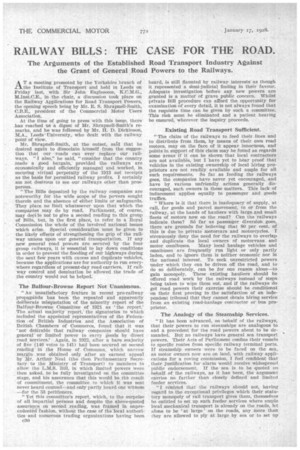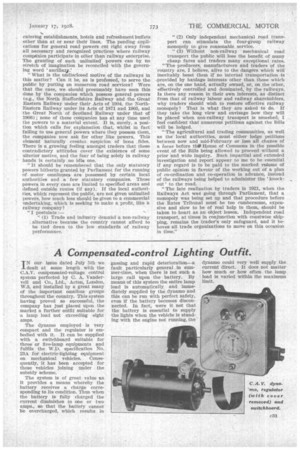RAILWAY BILLS: THE CASE FOR THE ROAD.
Page 52

Page 53

If you've noticed an error in this article please click here to report it so we can fix it.
The Arguments of the Established Road Transport Industry Against the Grant of General Road Powers to the Railways.
A T a meeting promoted by the Yorkshire branch of the Institute of Transport and held in Leeds on Friday last, with Sir John Eagle.some, K.C.M.G., M.Inst.C.E., in the chair, a discussion took place on the Railway Applications for Road Transport Powers, the opening speech being by Mr. E. S. Shrapnell-Smith, C.B.E., president of the Commercial Motor Users Association.
At the time of going to press with this issue, there has reached us a digest of Mr. Shrapnell-Smith's remarks, and he was followed by Mr. H. D. Dickinson, M.A., Leeds 'University, who dealt with the railway point of view.
Mr. Shrapnell-Smith, at the outset, said that he desired again to dissociate himself from the suggestion that our roads can ever replace our railways. "I also," he said, "consider that the country made a good bargain, provided the railways are economically and efficiently managed and worked, in securing virtual perpetuity of the 1913 net receipts as the basis for permitted railway profits. I certainly am not desirous to see our railways other than prosperous.
"The Bills deposited by the railway companies are noteworthy for the wide scope of the powers sought therein and the absence of either limits or safeguards. They place no limit whatsoever upon that which the compaides may do by road. Parliament, of course, may depile not to give a second reading to this group of Bills, but, in the first place, to refer to a Royal Commission the whole of the involved national issues which arise. Special consideration must be given to the likely effects of strengthening the grip of the railway unions upon our general transportation. If any new general road powers are secured by the four group railways, it is essential to lay down conditions in order to prevent the flooding of out highways during the next few years with excess and duplicate vehicles, because the applications are for authority to run everywhere regardless of present-day road carriers. If railway control and domination be allowed the trade of the country would not be helped.
The Balfour-Browne Report Not Unanimous.
"An unsatisfactory feature in recent pro-railway propaganda has been the repeated and apparently deliberate misquotation of the minority report of the Balfour-BroWne Committee of 1921 as • the report.' The actual majority report, the signatories to which included the appointed representatives of the Federation of British Industries and the Association of British Chambers of Commerce, found that it was not desirable that railway companies should have general" or limited power to carry goods by direct road services.' Again, in 1922, after a bare majority of five (146 votes to 141) had been secured on second reading iri the House of Commons, which narrow margin was obtained only after an earnest appeal by Mr. Arthur Neal (the then Parliamentary Secretary to the Ministry of Transport) to members to allow the L.M.S. Bill, in which limited powers were then asked, to be fully investigated on the committee stage, and his assurance that this would be the result of commitment, the committee to which It was sent never heard counsel—and only partly heard one witness —for the 53 petitioners.
"Yet this committee's report, which, to the surprise of all impartial persons and despite the above-quoted assurance on second reading, was framed in unprecedented fashion, without the case of the local authorities and numerous trading organizations having been e30
heard, is still flaunted by railwayinterests as though it represented a semi-judicial finding in their favour.. Adequate investigation before any new powers are granted is a matter of grave public concern. Whilst Private Bill procedure can afford the opportunity for examination of every detail, it is not always found that the requisite time can be given by such a committee. This risk must be eliminated and a patient hearing be ensured, wherever the inquiry proceeds.
Existing Road Transport Sufficient.
"The claim of the railways to feed their lines and to distribute from them, by means of their own road motors, may on the face of it appear innocuous, and points in support of this claim may be found as regards some areas if it can be shown that local contractors are not available, but I have yet to hear proof that vehicles in the existing ownership of local hiring proprietors are not readily available and ample for all such requirements. So far as feeding the railways goes, the companies have never yet encouraged, and have by various unfriendly actions generally discouraged, such owners in those matters.. This lack of inducement applies equally to passenger and goods traffics.
"Where is it that there is inadequacy of supply, at call, for goods and parcel movement, to or from the railway, at the hands of hauliers with large and small fleets of motors now on the road? Can the railways indicate them? SO far as passenger diversion goes, there are grounds for believing that SO per cent, of this is due to private motorcars and motorcycles. I strenuously deny the need for the railways to overlap and duplicate the local owners of motorvans and motor omnibuses. Many local haulage vehicles and omnibuses are frequently run light or only partly laden, and to ignore them is neither economic nor in the national interest. To seek unrestricted powers under which they can be driven off the road, and to do so deliberately, can be for one reason alone—to gain monopoly. These existing hauliers should be offered road work by the railways instead of steps being taken to wipe them out, and if the railways do get road powers their exercise should be conditional on their first proving to the satisfaction of an independent tribunal that they cannot obtain hiring service from an existing road-haulage contractor or bus proprietor.
The Analogy of the Steamship Services.
"It has been advanced, on behalf of the railways, that their powers to run steamships are analogous to and a precedent for the road powers about to be demanded. But no railways have general sea transport powers. Their Acts of Parliament confine their vessels to specific routes from specific railway terminal ports. If steamship owners were to be faced on the sea, as motor owners now are on land, with railway applications for a roving commission, I feel confident that their justification for alarm would receive widespread public endorsement. If the sea is to be quoted on behalf of the railways, as it has been, the argument carries no farther than closely defined and limited feeder services.
"I contend that the railways should not, having regard to the exceptional privileges which their statutory monopoly of rail transport gives them, themselves be entitled to set up such feeder services where ample local mechanical transport is already on the roads, let alone to be at large' on the roads, any more than • they are allowed to ply at large by sea or to set up catering establishments, hotels and refreshment buffets other than at or near their lines. The pending applications for general road powers cut right away from all necessary and recognized practices where railway companies participate in other than railway enterprise. The granting of such unlimited powers can by no stretch of imagination be reconciled with the governing word 'ancillary.'
"What is the undisclosed motive of the railways in this matter? Can it be, as is professed, to serve the public by putting on numerous road services? Were that the case, we should presumably have seen this done by the companies which possess general powers (e.g., the North Staffordshire Railway and the Great Eastern Railway under their Acts of 1904, the NorthEastern Railway under its Acts of 1871 and 1905, and the Great North of Scotland Railway under that of 1806); none of these companies has at any time used the powers to a material extent. It is, surely, a position which calls for explanation that, whilst in fact failing to use general powers where they possess them, the companies now ask for other like powers. This element naturally creates suspicion of bona _fides. There is a growing feeling amongst traders that these contradictory attitudes cover the existence of some ulterior motive, and the fear of being solely in railway hands is certainly no idle one.
"it should be remembered that the only statutory powers hitherto granted by Parliament for the running of motor omnibuses are possessed by certain local authorities and a few statutory companies. These powers in every case are limited to specified areas and defined outside routes (if any). If the local authorities, which represent the public, are not given unlimited Powers, how much less should be given to a commercial undertaking, which is seeking to make a profit, like a railway company?
"I postulate:—
"(1) Trade and industry demand a non-railway alternative because the country cannot afford to be tied down to the low standards of railway performance.
" (2) Only independent mechanical road transport can stimulate the four-group railway monopoly to give reasonable service.
" (3) Without non-railway mechanical road transport the public will lose the benefit of many cheap fares and traders many exceptional rates.
"The producers, manufacturers and traders of the 'country are, I believe, alive to the dangers which will inevitably beset them if no internal transportation is .provided by haulage interests other than those which are, on the one hand, actually owned, or, on the other, effeetively controlled and dominated, by the railways. Is there any reason In their own interests, as distinct from that of railway labour and railway shareholders, why traders should wish to restore effective railway monopoly? That is what they are asked to do. If they take the long view and envisage how they will be placed when non-railway transport is smashed, I feel cenfident that numerous petitions against the Bills will be lodged.
"The agricultural and trading communities, as well as they local authorities, must either lodge petitions between now and mid-February or lose all chance of a locus before tht Souse of Commons in the possible event of the Bills being allowed to proceed without a prior and wide inquiry. Such impartial and extended investigation and report appear to me to be essential if any regard is to be paid to the marked volume of public opinion in favour of the working out of a plan of co-ordination and co-operation in advance, instead of the railways being helped to administer the ' knockout ' to the road.
"The late realization by traders in 1921, when the Railways Act was going through Parliament, that a monopoly was being set up and that procedure before the Rates Tribunal must be too cumbersome, expensive and slow to be of real help to them, • should be taken to heart as an object lesson. Independent road transport, at times in conjunction with coastwise shipping, remains the trader's only safeguard, and it behoves all trade organizations to move on this occasion in time."












































































































